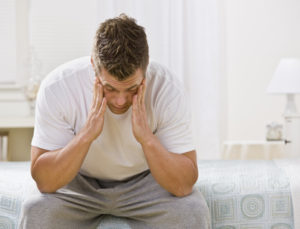Most likely, you’ve heard the words “manic depression” and/or “manic depressive” tossed around. The formal name of the disorder was switched to “bipolar disorder” back in 1980 but the mental illness is still often coined “manic depression” as well. Regardless of what it is termed, it is a serious problem that is growing more widespread each and every year, affecting millions.
In a recent study, it was found that each year 2.8% of all adults within the United States are subject to a bipolar disorder experience. It was also discovered that many of those individuals have more than one dealings with the disorder including types I and II.
What is Bipolar Disorder?
 In the realm of bipolar disorder, three main kinds exist. They are Bipolar I and II and Cyclothymic Disorder.
In the realm of bipolar disorder, three main kinds exist. They are Bipolar I and II and Cyclothymic Disorder.
Bipolar I
Bipolar I is characterized by a person experiencing a manic episode at least once in their lifetime. When an individual has a noticeable energy increase and an irritable or elevated mood (even euphoric in nature), a manic episode is determined. The change in behavior and mood lasts for a week at least.
It is not unusual for those with this type of disorder to have moods that shift dramatically from one extreme to the other such as feeling extremely happy and then being overly sad in a short span of time.
Mania symptoms may include:
- Increase of self-esteem – this scenario can be a big boost in self-confidence or even a grandiose, delusional perception of self.
- Notably becoming much more talkative and speaking loudly and more rapidly – when this is carried out in an angry or irritable mood, it can appear to be a rave or angry rant.
- Sleeping less but feeling rested still such as getting only 3 sleeping hours or none at all.
- Thoughts that race
- Heightened distraction
- Extreme restlessness
- Increase in time and attention spent on activities like starting new projects or activities and staying up all night to work on them. Sex drive may also greatly increase.
- High risk activities like shopping sprees and sexual promiscuity are common
In order for these symptoms to be qualified as manic episodes, there must be changes in moods and behaviors to the point that impairment is caused. This might involve financial hardships due to overspending, a car accident due to reckless driving, or problems caused in a relationship because of sexual behavior. Changes which result due to substance or alcohol use or medical reasons do not meet the requirements for a positive diagnosis.
One who has type I Bipolar disorder may or may not have a major depressive episode but most do.
Major Depression Episodes
 Bipolar depression takes place when a major depression episode occurs when the person has already had a hypomanic or manic episode.
Bipolar depression takes place when a major depression episode occurs when the person has already had a hypomanic or manic episode.
An episode of the major depressive kind is positively diagnosed when a group or cluster of symptoms remain present for the majority of days lasting for a minimum of two weeks.
Symptoms common to depression include:
- Having a depressed mood such as feeling empty, hopeless, sad, irritable, tearful, or sad
- Portraying a lack of interest in things and people that used to be enjoyed
- Finding it difficult to make decisions or to concentrate
- Feeling worthless or guilty without just cause or reasoning
- Thinking of suicide or having recurring thoughts about death
- Changes in appetite like being overly hungry or not hungry at all
- Weight gain or loss
- Changes in sleep patterns like sleeping too much or too little
- An agitated psychomotor activity level or decrease in psychomotor activity
- Being fatigue much of the time and a dramatic overall decrease in energy
If a person who’s experienced a major depressive type of disorder (MDD) has a hypomanic or manic episode, their diagnosis is then changed up to be a true bipolar disorder. The symptoms of hypomania or mania may continue to be present within MDD although the complete set of criteria fails to be met for the MDD diagnosis.
Bipolar II
A Bipolar II diagnosis occurs when a person has had one or more hypomanic episodes and also a major depression but has never experienced a manic episode. Although hypomanic and manic are similar, the difference is that a hypomanic episode is only required for a period of four days for the diagnosis.
Potential symptoms are exactly the same except that the impairment is not as severe, nor do they require hospitalization or have psychotic symptoms such as delusions or hallucinations.
Cyclothymic Disorder
Cyclothymic disorder happens when an individual experiences a high number of hypomanic symptoms in a given period but they are not consistent with the criteria required for full hypomania or for true depressive symptoms which take place over a period of two years.
Where teens and children are concerned, the frame of time is shortened. One who has Cyclothymic disorder fails to completely have all the criteria for a hypomanic episode, a manic one, or a full major depression.
Suicide and Bipolar Disorders
 The presence of a bipolar type disorder increases an individual’s risk of committing suicide. The suicidal risk of any given individual who suffers from a bipolar disorder is estimated to stand at being right at 15 times more than the risk of the population in general.
The presence of a bipolar type disorder increases an individual’s risk of committing suicide. The suicidal risk of any given individual who suffers from a bipolar disorder is estimated to stand at being right at 15 times more than the risk of the population in general.
Furthermore, somewhere in the neighborhood of one third of all of those who are formally diagnosed with having a disorder of the bipolar II kind have been reported as having had attempted suicide one or more times in their lives.
According to experts, the biggest risk where suicide is concerned seems to be with individuals who have previously attempted it and also with those who have gone through depression in the given year. Suicidal thoughts are not visible but there are certain warnings that tend to signal that suicidal thinking is present and is a threat to one’s safety.
Here are some suicide warnimg signs to heed:
- Talking about wanting to die/kill self
- Concluding that there is no good reason in which to go on living
- Researching methods of suicide
- Feeling trapped and/or being in unbearable pain
- Having an increased desire for or engagement in substance or alcohol abuse
- Talking about how much of a burden she or he is to others
- Getting too little or too much sleep
- Being overly agitated or anxious
- Being irresponsible and recklessness
- Feeling isolated or becoming isolated
- Saying they wish to get revenge and/or going into a rage
- Displaying extreme mood swings
- Telling people goodbye
- Giving their possessions away
- Irritability/anxiety/depression
- Experiencing humiliation
- Having a loss of interest in people and in things
The above list is certainly not an exhaustive one. There are other warning signs which may also be present. Seeking the immediate help of a profession is imperative when suicidal thoughts or actions are present. In the event that an individual appears to be or is actively suicidal, call 9-1-1 immediately or to go directly to a nearby emergency room.
Ways to Cope with Bipolar Depression
Strategies which are helpful when coping with depression that is so often present in the realms of bipolar disorders can include:
- Understanding your diagnosis and learning to quickly and effectively recognize triggers. There’s a wealth of great information from reputable sources readily available. A medical doctor or your therapist can usually steer you in the best direction.
- Making a schedule on a daily basis with goals which are realistic and attainable. One depression symptom which seems to be common is a dramatic loss of motivation and interest. When you fail to engage in any activities, however, you can actually cause your depression to worsen and that can end up producing both feelings of isolation and actual isolation. If a given activity gets to be too overwhelming, break it up into small pieces which are more doable.
- Don’t isolate yourself because loneliness will only intensify your depression symptoms and negative feelings. Being relational beings, humans find comfort and relief within the caring support of family and friends. If you’re feeling lonely, just reach out to someone you love. A great idea is to volunteer to help others like at a church or nursing home. Even helping at an animal shelter is fabulous.
- Regulate your thought patterns so that you are checking for depressive thoughts. You are also able to take your thoughts captive to determine if they are logical or emotionally based.
- The use of mindfulness can help you learn control over your thoughts instead of them having control over you. You’ll discover there are tons of apps and websites which are helpful in guiding you through mindfulness exercises.
- Relaxation using various techniques like paced breathing, guided meditation, and progressive relaxation of your muscles.
- Exercising. The benefits, health-wise, of doing so are well-documented. You can even consult with your physician to find out what kinds of exercise are the best ones for you, personally.
- Keeping a journal
- Meditating on reassuring Scriptures. For example, Isaiah 41:10 tells us not to fear or be afraid because God is with us. We need not be dismayed or discouraged because He will always be there to help us. Matthew 11:28 ensures us that God is always on our side.
Bipolar Depression Treatment

If a loved one (or yourself) is displaying some or all of the bipolar disorder signs and symptoms, it’s imperative to have an accurate evaluating diagnosis and if it is a confirmed one, to seek treatment as well. If a bipolar disorder isn’t treated, the symptoms will only get worse. They will not just disappear.
Diagnosis involves a medical evaluation so other possible medical symptoms, side-effects from medications, or other causes can be ruled out. Recommended treatment often involves scheduled wamedication and family, group, and/or individual therapy.
A good number of viable and effective approaches along the psychotherapy line are now available which can greatly help to treat the disorder. The therapeutic cognitive behavioral technique is one such therapy, also referred to as CBT.
It involves teaching individuals ways to fight negative thinking and negative behaviors. In this technique, you’ll learn multiple strategies to help you to cope with your emotions in a positive and healthy manner.
A counselor can assist you in exploring triggers that may bring on episodes, such as stress. Then you can learn effective ways in which to manage those triggers. Such techniques as stress management may play an important part.
Family therapy might also be part of the picture because it is helpful for members of the family to become educated about the disorder so they can help the one who is Bipolar. Finding out what stresses the affected individual out is important so a family member can help relieve the stress rather than make it worse. Taking a look into the dynamics of the family is priceless in treatment.
Conclusion
Bipolar disorders and bipolar depression must be taken seriously, as they can entail very severe and negative consequences. However, treatment is available and is vital in order to live a quality life. In the event that you suspect you or a loved one has a bipolar disorder, it is imperative to act immediately and not to put off getting help from a caring and qualified counselor. We’re here and are honored and excited to walk with you and help guide you on the path to growth and healing!
Photos:
“Stress,” courtesy of TheDigitalArtist, pixabay.com, CC0 License; “Tired Man”, Courtesy of Mic445, Flickr.com, CC BY 2.0 License; “Tearful”, Courtesy of Kat J, Unsplash.com; CC0 License; “Resting place,” Courtesy of Christian Reimer, Flickr.com, CC BY-SA 2.0 License
-
Kate Motaung: Curator
Kate Motaung is the Senior Writer, Editor, and Content Manager for a multi-state company. She is the author of several books including Letters to Grief, 101 Prayers for Comfort in Difficult Times, and A Place to Land: A Story of Longing and Belonging...





